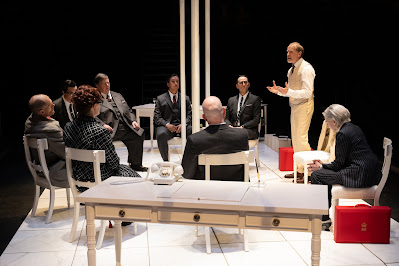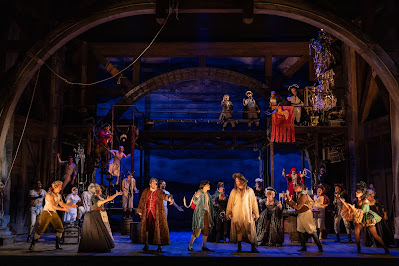Reviewed by James Karas
Les Belles-Soeurs is an iconic Canadian play that gives
a penetrating and piercingly accurate portrait of Quebec society in the 1960s.
The Stratford Festival gives us a superb production of Michel Tremblay’s play
which premiered in Montreal in 1968. It is directed by Esther Jun and has a
cast of fifteen actors representing working class women.
Germaine
Lauzon (Lucy Peacock) has won one million stamps and they have just been
delivered to her home. She is deliriously and deliciously happy dreaming and
planning what she will do with her wealth. Her working-class imagination takes flight
but it stays in her kitchen and her house. New appliances and furnishings are
basically what she dreams of buying.
Germaine
invites her sisters Rose Ouimet and Gabrielle Jodoin, her sister-in-law Thérèse Dubuc, and friends and
neighbours. Her sister Pierrette Guérin is not invited but she comes anyway. Together
with Germaine’s daughter Linda, and friends and neighbours, there are fifteen women
in her kitchen to paste the stamps in books.
The
women discuss a huge array of subjects over the course of the play with rancor,
candor, humour and pathos. What evolves is a picture of the lives of the women
and by extension a portrait of Quebec society of the period.
Tremblay
draws the women’s characters succinctly and beautifully. Aside from the
individual characteristics of the women we get a
depiction of the social order that they
occupy. There are differences among the women but they all seem to be living
lives of quiet desperation.
Lucy
Peacock gives a powerful performance as Germaine, a woman married to an
alcoholic husband with two children who do not listen to her. But having won
one million stamps she sees a way out and for some hours she dreams of a better
life after acquiring the things that money can bring. Her dream comes crashing
around her when her friends want to share in her “happiness” and things do not
turn out as she imagined. I will not disclose the end of the play.
Seana
McKenna gives a superb performance as Rose Ouimet, a religious widow who is
concerned about other-worldly matters.
Allison
Edwards-Crewe plays a flamboyant Pierette who works in a bar and is shunned by
the other women. The young Lise (Marissa Orjalo) reveals that she is pregnant, a
shocking state at the time. Pierette has the decency to offer to find a doctor
to perform an abortion instead of getting a back-alley procedure that seemed to
be the only choice. Pierette reveals that shocking news that Angeline frequents
the club where she works. The news sends shockwaves among the religious women
and they shun the pathetic Angeline.
Irene
Poole plays Therese who arrives with her mother-in-law Olivine (Diana Leblanc)
and proceeds to abuse the poor woman who is slumped in a wheelchair and makes unwelcome
noises. Lisette de Courval likes nice clothes and sex
but not with her husband. Jealousy is a common underlying characteristic of
most of the women and combined with greed it is the catalyst that brings the
finale of the play.
Religion
plays an important role in the lives of all of them and they kneel and cross
themselves when they hear the rosary on the radio. One method of escaping their
reality is to play bingo at the church and there is an extended and hilarious
scene of that pastime.
Tremblay
provides a number of monologues, choral passages one might say, where the lights
are dimmed and a spotlight is shone on a character who speaks about her life
directly to the audience. This is a brilliant way of pacing the play which
otherwise is a noise fest with the fifteen women speaking cacophonously at
times.
The
set design by Joanna Yu shows a simple 1960s kitchen with a table and chairs. Michelle
Bohn’s costumes represent working class clothes that are suitable for the era
and the production.
Les Belles-Soeurs is a richly-layered play that appears very simple. Director Esther Jun handles a talented cast judiciously and expertly through the crowded dialogues and movements as well as the monologues. It is a superb production of a theatrical landmark.
___________________________
Les Belle-Soeurs by Michel Tremblay opened on August
25 and continues until October 28, 2023, at the Festival Theatre, Stratford, Ontario www.stratfordfestival.ca
James Karas is the Senior Editor - Culture of The Greek Press




















